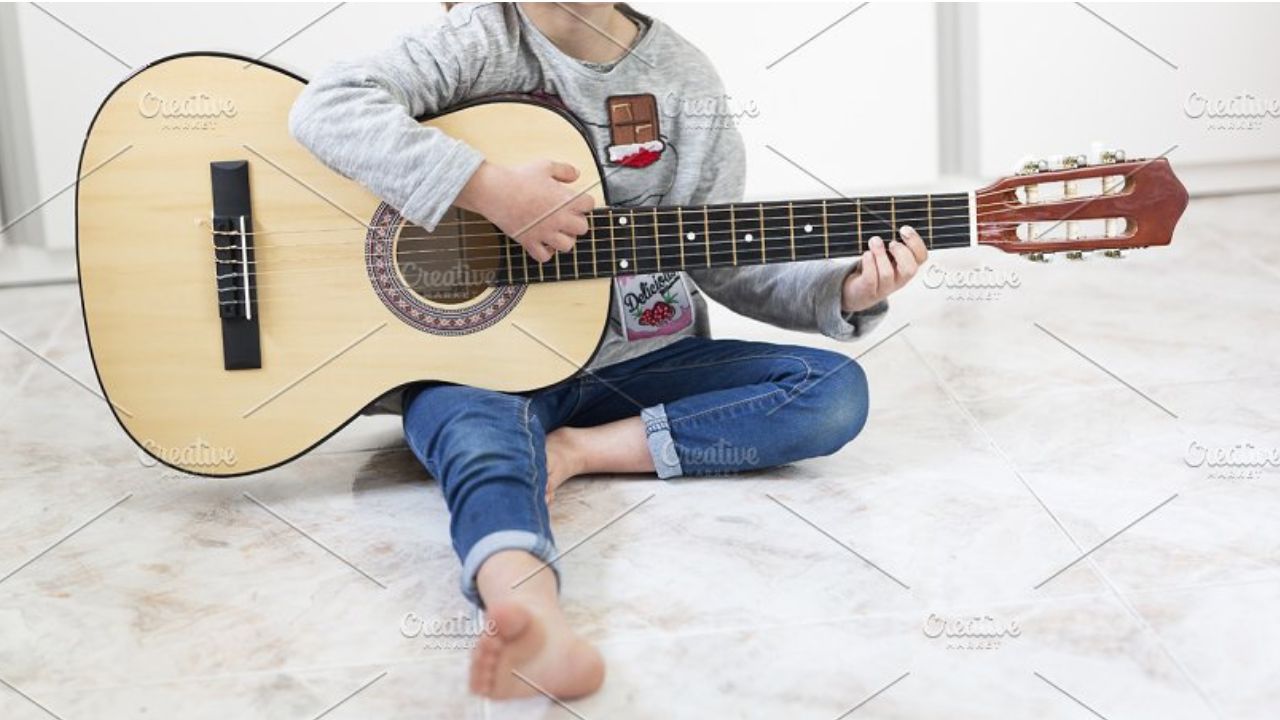Best Acoustic Guitars for Beginners with Small Hands
Best Acoustic Guitars for Beginners with Small Hands If you’re a beginner looking to pick up a guitar, one of the most important factors to consider is finding an instrument that fits your physical attributes and playing style. Selecting the ideal acoustic guitar significantly impacts the ease of learning and successful advancement for those with tiny hands in the music industry.
Are you a beginner with small hands looking to embark on your musical journey with an acoustic guitar? You’re in the right place! In this guide, we’ll discuss the challenges faced by those with petite hands and help you find the perfect acoustic guitar to suit your needs and comfort.
Best Acoustic Guitars for Beginners with Small Hands
Playing the guitar with small hands presents challenges. Standard-sized guitars often have wider necks and longer scale lengths, making fretting chords and reaching certain positions difficult for those with smaller hands. This may cause unease, annoyance, or even discouragement from playing the instrument. Therefore, small-handed guitarists must select a guitar that provides comfortable playability without sacrificing tone.
Guitar Sizes and Scales
Before discussing specific guitar models, it’s essential to understand the significance of size and scale length. Acoustic guitars come in various sizes, from small travel-sized instruments to full-sized dreadnoughts. The distance between the nut and the saddle, or scale length, influences fret spacing and overall playability.
Choosing guitars with narrower neck widths and shorter scale lengths for individuals with small hands can significantly enhance comfort and ease of playing. These features ensure that fretting chords and reaching across the fretboard remain manageable, even for those with petite hands.

Benefits of Acoustic Guitars for Small Hands
Acoustic guitars offer several advantages over their electric counterparts for players with petite hands. They are simpler to handle because of their small size and lightweight construction, which makes fretting and chord changes more straightforward. Furthermore, acoustic guitars often have shorter scale lengths and slimmer necks, which improve comfort and playability.
Ease of Playability
Acoustic guitars designed with smaller dimensions offer enhanced playability for individuals with petite hands. The reduced neck width and shorter scale length make it easier to navigate the fretboard, allowing for smoother chord transitions and intricate fingerpicking patterns.
Comfortable Neck Size
One of the most significant benefits of acoustic guitars for small hands is the comfortable neck size. These guitars feature slimmer neck profiles, providing a more natural grip and reducing strain on the fingers and wrist during extended playing sessions.
Lightweight Design
Many acoustic guitars tailored for smaller hands are crafted from lightweight materials, such as mahogany or spruce, making them easier to hold and maneuver. This feature is especially beneficial for younger players or those with limited upper-body strength.
Improved Finger Dexterity
Playing an acoustic guitar with a narrower neck encourages better finger agility and coordination, essential skills for mastering complex chord progressions and intricate melodies. With practice, individuals with small hands can achieve greater precision and control over their playing technique.
Enhanced Reachability
Smaller acoustic guitars often feature a cutaway design, allowing easier access to higher frets and expanding the player’s range of musical expression. This feature enables individuals with petite hands to explore a wider variety of chords and melodies without feeling restricted by their hand size.
Customization Options
Many manufacturers offer customizable options for acoustic guitars, allowing players to tailor the instrument to their specific preferences and requirements. From neck profile and fret size to string gauge and action height, these customization options ensure a personalized playing experience for individuals with small hands.
Affordable Prices
Contrary to popular belief, acoustic guitars designed for smaller hands are available at affordable price points, making them accessible to aspiring musicians on a budget. Whether purchasing a new or used instrument, individuals with petite hands can find high-quality guitars that suit their needs without breaking the bank.

The Value of Selecting the Correct Guitar
Making the correct guitar choice may significantly influence your musical endeavours. Beyond mere aesthetics, the perfect instrument aligns with your playing style, preferences, and musical aspirations. A guitar that feels comfortable in your hands and resonates with your desired tone enhances your playing experience, making practice sessions more enjoyable and performances more rewarding. The right guitar inspires creativity and motivation, catalyzing musical exploration and expression. Whether you’re strumming chords, fingerpicking melodies, or shredding solos, choosing a guitar that speaks to you personally ignites a passion for music that drives you to new heights of skill and artistry. The importance of selecting the right guitar lies in its ability to become an extension of yourself, empowering you to unlock your full potential as a musician.
Adjusting Action on Acoustic Guitar
Adjusting the action on your acoustic guitar is a crucial aspect of maintenance that can significantly impact playability and sound quality. The strings’ height above the fretboard is called action, and achieving the ideal balance is crucial for both comfortable playing and great sound generation. High action can make fretting difficult and cause intonation issues, while low action may lead to buzzing and fret noise. Adjusting the truss rod, saddle, and nut can fine-tune the action to suit your playing style and preferences. If you need to become comfortable with the procedure, it’s advised that you speak with a qualified guitar technician or luthier because making incorrect modifications might harm your instrument. Regularly checking and adjusting the action ensures that your acoustic guitar performs at its best, allowing you to enjoy effortless playability and pristine tone for years to come.

Top Recommendations for Acoustic Guitars Suitable for Small Hands
For beginners with small hands, selecting the right acoustic guitar is crucial for comfort and ease of play. Here are some top recommendations tailored to petite players:
Yamaha FG800: Known for its slim neck profile and comfortable playability, this guitar offers excellent sound quality at an affordable price.
Taylor GS Mini: With its scaled-down body and shorter scale length, the GS Mini provides a comfortable playing experience without sacrificing tone or projection.
Fender CD-60SCE: This guitar’s smaller body and narrow neck make it perfect for players with smaller hands. It offers versatility and playability for various musical styles.
Epiphone EL-00 Pro: With its warm, well-balanced tone, this parlor-sized guitar is perfect for fingerstyle playing and tiny hands.
Martin LX1 Little Martin: The LX1 is ideal for novices with little hands since it is lightweight and strong, and because of its shorter scale length and smaller body, it provides a comfortable playing experience.
Taylor GS Mini
Slim neck profile with 1-11/16-inch nut width
Shorter scale length (23.5 inches)
Compact, grand symphony body shape for portability
Pros: Comfortable playability, rich tone, high-quality craftsmanship
Cons: Higher price point, smaller body may lack projection
Martin LX1 Little Martin
Slim neck profile with 1-11/16-inch nut width
Shorter scale length (23 inches)
Small body size for easy handling
Pros: Lightweight and portable, surprisingly loud for its size, reputable brand
Cons: Limited bass response, may require setup adjustments out of the box
Fender FA-15N
Slim neck profile with a 1.69-inch nut width
Shorter scale length (23.3 inches)
3/4-size dreadnought body shape
Pros: Affordable, comfortable to play, warm tone
Cons: Lower-end construction materials may need setup adjustments for optimal playability.
Epiphone EL-00 Pro
Slim Taper D-profile neck with a 1.68-inch nut width
Shorter scale length (24.75 inches)
Small-bodied acoustic-electric guitar
Pros: Versatile electronics, vintage aesthetic, comfortable playability
Cons: Electronics may require occasional maintenance and may need setup out of the box
Choosing the Right Guitar
For a novice with tiny hands, selecting the appropriate acoustic guitar is essential to ensure comfort and ease of playing. Fortunately, several options are tailored to accommodate smaller hands while still delivering excellent sound quality and playability. Look for guitars with a slim neck profile and shorter scale length, which reduce the stretch required to reach chords and notes. Models with smaller body size, such as concert or parlour guitars, also provide a more manageable playing experience for petite players. Brands like Yamaha, Taylor, and Fender offer beginner-friendly acoustic guitars designed with these considerations. To determine the ideal fit for your hands and playing style, you may also visit a music store and test on several models and sizes. When you start your musical adventure, you may ensure a pleasant and joyful learning experience by selecting an acoustic guitar that complements your physical features.
Key Factors to Consider
When selecting an acoustic guitar for small-handed beginners, two crucial factors come into play: neck width and scale length. Opting for a narrower neck and shorter scale length guitar can significantly enhance comfort and playability.
Recommended Guitar Models
Several guitar models are renowned for catering to players with small hands. Instruments like the Taylor GS Mini and Yamaha APXT2 boast narrower necks and shorter scales, making them ideal for beginners seeking comfort and ease of play.
Testing the Comfort
There’s more to choosing the finest acoustic guitar for little hands than merely choosing a model off the shelf for a novice. It’s about determining playability and comfort. Look for guitars with narrow necks and shorter scales, like those in the parlour or concert-sized guitars. These features reduce the stretch needed to reach chords, making fretting easier and more comfortable for petite hands. Brands like Yamaha, Taylor, and Fender offer beginner-friendly options with these specifications. However, visiting a music store and physically trying out different models is essential. Please sit down, hold the guitar, and play a few chords to assess how it feels in your hands. Finding the right acoustic guitar for small hands is about finding the perfect balance between comfort, playability, and sound quality. So, take your time, experiment, and choose the guitar that feels like an extension of you.
Accessories and Resources
When it comes to selecting the best acoustic guitar for beginners with small hands, it’s not just about the instrument itself. Accessories and resources play a vital role in enhancing the learning experience. Consider investing in a comfortable guitar strap to support your instrument during long practice sessions, especially if you’re petite. Additionally, accessories like a capo can make playing chords that require stretching easier, while a guitar stand keeps your instrument safe and accessible. Online resources such as instructional videos, chord charts, and beginner-friendly songs cater to various learning styles and provide valuable guidance along your musical journey. It’s a good idea to check out local music forums and communities where you can meet other musicians, share ideas, and ask questions to locate the ideal small-handled acoustic guitar. With the right combination of accessories and resources, you’ll be well-equipped to confidently and enthusiastically embark on your musical adventure.
Essential Accessories
In addition to the guitar itself, beginner players should invest in essential accessories like a capo and guitar strap. A capo allows for easy key transposition, while a strap provides stability and comfort during extended playing sessions.
Online Resources
Luckily, many helpful materials and courses are available online for novices with little hands. Comprehensive tutorials covering everything from basic chords to advanced techniques can be found on websites such as JustinGuitar.com. Using these materials may improve your abilities and learn more quickly.
Practice and Patience
Mastering the guitar requires dedication, practice, and patience, regardless of hand size. Consistent practice, even in short bursts, is key to improving your playing technique and musicality. Embrace the learning process, celebrate small victories, and don’t be discouraged by setbacks.
Maintenance and Care
Maintenance and care are essential aspects of owning an acoustic guitar, especially for beginners with small hands. Regularly cleaning the instrument with a soft cloth and guitar-safe cleaner removes dirt and oils, preserving its appearance and playability. Keeping the strings clean and changing them when necessary ensures optimal tone and longevity. Proper storage in a humidified environment protects against damage from changes in temperature and humidity. Investing in a quality gig bag or hard case provides further protection during transportation. By incorporating simple maintenance practices into your routine, you can keep your acoustic guitar in top condition, ensuring years of enjoyable playing experiences.
Proper Care Regimen
Caring for your acoustic guitar is essential to ensure its longevity and optimal performance. Regular maintenance practices such as tuning, cleaning, and storing the instrument correctly can prevent damage and preserve its pristine condition.
Tuning and Cleaning Tips
Invest in a reliable tuner to keep your guitar in tune, enhancing its sound quality and playability. Additionally, clean your guitar regularly with a soft cloth to remove dust and debris, paying special attention to the fretboard and strings.
Storage Guidelines
To avoid warping or breaking, keep your acoustic guitar in a stable, moderately humid atmosphere when not in use. To prevent unintentional harm to the instrument, think about purchasing a protective case or stand.
Conclusion
Finding the ideal acoustic guitar can be easy for a novice with small hands. Prioritizing variables like body size, nut width, and scale length can help you focus your search and choose an instrument that best meets your requirements and tastes. There’s a great guitar out there waiting for you, regardless of your preference for the portability of a 3/4 scale nylon-string instrument or the small size of a concert or parlor guitar. Remember to experiment with many models to determine the most motivating and cozy to play. You may start a fulfilling musical adventure and become a proficient guitarist with the correct instrument in hand.
FAQ
Do I need a special guitar if I have small hands?
Best Acoustic Guitars for Beginners with Small Hands: While it’s not mandatory, opting for a guitar with features tailored to small-handed players can significantly enhance your playing experience and make learning more comfortable.
Are smaller guitars suitable for adults with small hands?
Yes, many smaller-bodied guitars are designed to accommodate players of all ages and skill levels, including adults with petite hands.
Can I modify a standard-sized guitar to make it more suitable for small hands?
While it’s possible to make adjustments such as changing the nut width or filing down the frets, choosing a guitar already designed with small-handed players in mind is generally more practical.
What should I prioritize when choosing a guitar: comfort or sound quality?
Ideally, it would be beneficial to balance the two. Selecting a guitar that is comfortable to play and has a tone you like will inspire you to practice and advance your abilities.
Do acoustic-electric guitars cater to small-handed players?
Yes, many acoustic-electric guitars come in smaller body sizes with slim neck profiles, making them suitable options for individuals with small hands who also want the flexibility of amplification.

